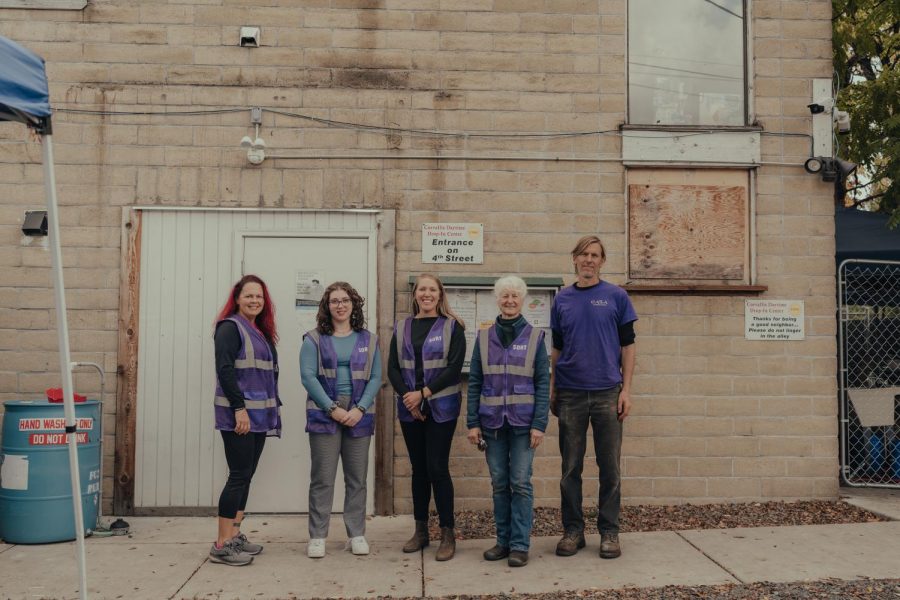‘More compassion and understanding’ needed to combat Corvallis hunger, homelessness
Hunger & Homelessness Awareness Week to take place Nov. 13 to 21 with COVID-19 modifications
November 1, 2021
The majority of people are one step away from experiencing homelessness or hunger, according to Andrea Myhre, executive director of Corvallis Housing First.
CHF is a non-profit whose mission is to provide housing and services to people who have experienced homelessness. According to Myhre, hundreds of thousands of Americans, if not more, are at risk of experiencing homelessness or hunger. A weighty truth that not a lot of people in society recognize is that job loss or chronic illness can seriously change one’s circumstances.
Such is the stigma of homelessness and hunger in the United States: a complex and sensitive set of issues and barriers that are widely generalized by the public. This phenomenon is one of the main reasons Hunger & Homlessness Awareness week takes place every year from Nov. 13 to 21.
During a typical year, CHF and other local non-profit organizations would host a myriad of events to get people involved with, exposed to and talking about these issues. However, this year being an outlier of public safety concern due to COVID-19, normal events have been modified or put on hold.
“Wisdom From the Streets” is an event typically hosted by the Whiteside Theatre in collaboration with CHF and other organizations, in which short films and talks about the complex issues contributing to hunger and homelessness are shared with an audience. This year, the event is not staged to take place due to COVID-19; however, CHF is tentatively planning on hosting virtual tours of their facilities.
“Housing affordability and availability is a huge issue [in Corvallis especially], also discrimination in housing,” Myhre said. “People that have any sort of criminal background, have challenging credit histories [or] have behavioral health issues—it’s just increasingly hard for them to get housing.”
What’s important about hunger and homelessness awareness, according to Myhre and other professionals working on these issues, is that people recognize the structural and bureaucratic barriers that exist and prevent people from accessing affordable housing and healthcare services. While it’s illegal for homeowners to discriminate against anyone, bias still exists in a refined form within systems of housing and healthcare, perpetuating challenges that have made finding a house to live in so difficult in the first place.
Short term, Myhre believes the Corvallis community needs to focus on building more affordable housing, providing rent-support programs and making housing options available for people who are the most vulnerable—but ultimately, compassion is where the solutions are found.
“We’re all humans, and we all need that connection with each other, and caring. That’s what makes us healthy and thrive—those human connections,” Myhre said. “Housing is great, having food is great and having some form of income is great. But we also need those healthy connections and bonds… isolation is the root cause of ongoing behavioral health, mental health issues and addiction.”
Building relationships based on trust is the foundational belief of another non-profit in town, the Corvallis Daytime Drop-in Center.
Homelessness and hunger awareness advocacy is a year-round process for the CDDC, said Maddie Bean, a graduate student at Oregon State University’s College of Public Health and Human Sciences who also serves as the coordinator for a program called the Street Outreach and Response Team.
Bean’s ongoing work with the SORT team at the CDDC includes building awareness of the impacts of “camp sweeps,” a phenomenon that completely goes against building trust with those experiencing hunger and homelessness, and deeply impacts people experiencing homelessness in Corvallis.
Camp sweeps are just what you might imagine they are: a state agency coming through an encampment and forcibly removing people from where they’re staying, often removing all of their belongings too.
During the onset of the pandemic in 2020, camp sweeps and camp postings—notices to vacate a campsite—were put on hold, according to Bean. This May, sweeps and postings began again.
Aleita Haas-Holcomb is board chair and a long time member of the CDDC. According to her and Bean, camp sweeps are re-traumatizing events that happen frequently throughout the year, and stem from a society that has no other answer to the structural issues that people experiencing homelessness face, leaving people who are living homeless with a perpetual feeling of insecurity.
According to the Benton County Community Health Assessment for 2017-2021, an estimated 14,000 people in Benton County face food insecurity and 66% of Oregon residents who earn less than $50,000 per year live in unaffordable housing while the population of people living homeless grows on a yearly basis. Children and college students are among those affected. Unaffordable housing is categorized by housing that costs more than 30% of household income.
“A word that I’ve come to really appreciate and use more accurately these days is ‘implicit bias,’” Haas-Holcombe said. “If we could move the needle in this community for folks who have implicit bias [against people experiencing homelessness] towards more compassion and understanding, that would be a really big deal.”















































































































